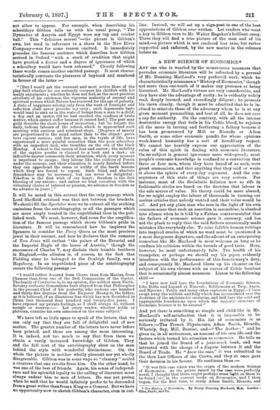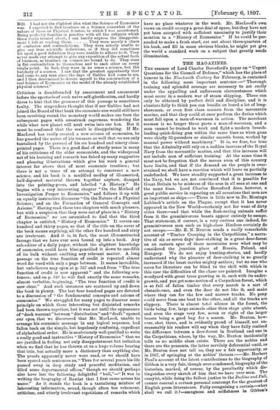A NEW SCIENCE OF ECONOMICS.*
ANY one who is wearied by the monotonous sameness that pervades economic literature will be refreshed by a perusal of Mr. Dunning MacLeod's very perfervid work, whioh he
characteristically misnames a " History of Economics," though not more than one-tenth of it makes any pretence at being historical. Mr. MacLeod's virtues are very considerable, and they have also the advantage of rarity; he is evidently widely read, deeply learned, and exceedingly diligent; he presents his views clearly, though it must be admitted that he is in-
clined to misstate those of the adversary whom he is at any given moment pummelling, and best of all, he does not care
a rap for authority. On the contrary, with all the intense destructive energy that boils in his Celtic blood, he rejoices all the more in tarring and feathering a fallacy because it has been pronounced by Mill or Ricardo or Adam Smith, or some other economic pundit for whose opinions weak-kneed humanity has a sort of hereditary respect. We cannot too heartily express our appreciation of the value of this spirit in dealing with economic literature. On no subject is general ignorance more widespread ; most people's eoonomic knowledge is confined to a conviction that three or four men, whom they have heard of as such, were great economists, and that anything that they said or wrote is above the sphere of every-day argument. And the con-
sequences of this state of things are very serious. For instance, most of the Socialistic fallacies now so rife in fashionable circles are based on the doctrine that labour is
the sole source of value. No theory could be more absurd, for we might employ the labour of thousands in turning out
useless articles that nobody wanted and their value would be nil. And yet any plain man who sees in the light of his own
common-sense that such an assertion is moonshine, is abashed into silence when he is told by a Fabian controversialist that the fathers of economic science gave it currency, and has not the pluck to reply that the said fathers occasionally made mistakes like everybody else. To raise fallible human writings into inspired oracles of which no word must be questioned is a most dangerous departure, and the advent of an enterprising iconoclast like Mr. MacLeod is most welcome as long as he confines his criticism within the bounds of good taste. Here, however, he most unfortunately fails. The health of his trumpeter, or perhaps we should say his piper, evidently interferes with the performance of this functionary's duty, and consequently Mr. MacLeod blows up his chanter on the subject of his own virtues with an excess of Celtic bombast that is occasionally almost nauseous. Listen to the following skirl :-
" I have now laid bare the foundations of Economic Science. Like Botta and Layard at Nineveh ; Schliemann at Troy, Argos, and Mycente ; Petrie and many other explorers in Egypt—I have swept away the rubbish and folly which has accumulated over the doctrines of the ancients for centuries, and laid bare the solid and impregnable foundations upon which the majestic structure of Economic Science is to be erected."
And yet there is something so simple and child-like in Mr. MacLeod's self-satisfaction that it is impossible to be seriously irritated by it. His list of economists is as
follows :—The French Physiocrats, Adam smith, Ricardo, Whately, Say, Mill, Bastiat, and—" The Author;" and he gives us, in all seriousness, an a000unt of his awn life and the factors which turned his attention to economics. He tells us
that he joined the Board of a joint-stock bank, and was intrusted with the charge of a dispute between it and the Board of Trade. He "drew the case," it was submitted to the then Law Officers of the Crown, and they at once gave their decision in his favour. He continues thus:— "It was this case which was the origin of the modern Science of Economics. As the points raised by the case were perfectly novel, I thought that there might perhaps some light on them to be found [sic] in the current books on Economics, and I then began, for the first time, to study Adam Smith, Ricardo, and • The History of Economics. By Henry Dunning MacLeod, H.A. London Bliss, Sand., and Co.
Mill. I had not the slightest idea what the Science of Economics was. I expected to find treatises on a Science somewhat of the nature of those on Physical Science, to which I was accustomed. Being perfectly familiar in practice with all the subjects which these works treated about, I can hardly express the disappoint-
ment I felt at reading them They were merely a chaos of confusion and contradictions. They were utterly unable to give any true scientific definitions, or if they did sometimes hit upon a good definition they were unable to adhere to it. They never made any attempt to give any exposition of the actual facts of business, as treatises on science are bound to do. They were in flat contradiction to themselves and to each other on every single point. In fact, they were in no sense a science, but the butchery of a science. I saw that the greatest opportunity that had come to any man since the days of Galileo had come to me, and I then determined to devote myself to the construction of a real Science of Economics on the model of the already established physical sciences."
Criticism is dumbfounded by amazement and amusement
before the spectacle of such naive self-glorification, and hardly dares to hint that the grammar of this passage is sometimes faulty. The stupendous thought that if our Galileo had not joined the Board of that bank the economic sun would still have been revolving round the monetary world makes one turn the subsequent pages with awestruck eagerness, wondering the while what new planet will next swim into our ken. But it must be confessed that the result is disappointing. If Mr. MacLeod has really created a new science of economics, he has guarded the secret of his treasure so well that we are only tantalised by the perusal of his six hundred and ninety close- printed pages. There is a good deal of sturdy sense in many of his criticisms of the older economists, and the widespread net of his learning and research has fished up many suggestive and pleasing illustrations which give his work a general interest far above that of most economic treatises ; bat there is not a trace of an attempt to construct a new science, and his book is a muddled medley of ill-assorted, half-digested material thrown together anyhow, dumped into the printing-press, and labelled "A History." He begins with a very interesting chapter " On the Method of Investigation Proper to Economics," and follows it up with an equally instructive discourse "On the Nature of a Physical Science; and on the Formation of General Concepts and Axioms." Having read these two chapters with much pleasure,
but with a suspicion that they were out of place in a " History of Economics," we are astonished to find that the third chapter is entitled, " History of Economics." It covers one hundred and thirty pages, so that if the title on the cover of the book means anything, all the other five hundred and sixty are irrelevant. And it is, in fact, the most ill-constructed farrago that we have ever seen bound up into a book. Any sub-editor of a daily paper, without the slightest knowledge
of economics, could have blue-pencilled it down to one-fifth .of its bulk without omitting any relevant matter. A long passage on the true function of credit is repeated almost word for word with only a page between. It seems incredible, but unbelievers may open at p. 347 and read from " The true function of credit is now apparent" and the following sen- tences; and on p. 349 he will find exactly the same remarks, -almost verbatim, beginning, "The true f nnction of credit is now clear." And such instances are scattered up and down the book in plenty. The last four hundred pages are devoted to a discussion of "the fundamental concepts and axioms of economics." We struggled for many pages to discover some principle on which these interesting but disjointed remarks had been thrown together, but it was not until the appearance of "dock warrant" between "distribution" and "draft" opened our eyes, that we discovered: that Mr. MacLeod, unable to arrange his economic message in any logical sequence, had fallen back on the simple, but hopelessly confusing, expedient of alphabetical order. He is so obviously well qualified to write a really good and instructive " History of Economies " that we are justified in feeling not only disappointment but irritation when we find that he has thrown at us a huge volume bearing that title, but actually more a dictionary than anything else. The proofs apparently never were read, or we should have been spared such sentences as, " Thus for several years his life passed away in deep study and peaceful meditation, and 'filled some departmental offices," though we should perhaps also have lost the following delightful " bull,"—" It was in
writing the biography of Bastiat that I first came across his same." As it stands the book is a tantalising mixture of interesting information, sound, though often too vehement, criticism, and utterly irrelevant repetitions of remarks which have no place whatever in the work. Mr. MacLeod's own views on credit occupy a great deal of space, but they have not yet been accepted with sufficient unanimity to justify their mention in a " History of Economics." If he could be per. suaded to make a fresh start, cut out about three-quarters of his book, and fill in some obvious blanks, he might yet give the world a standard work on a subject that greatly needs illumination.







































 Previous page
Previous page